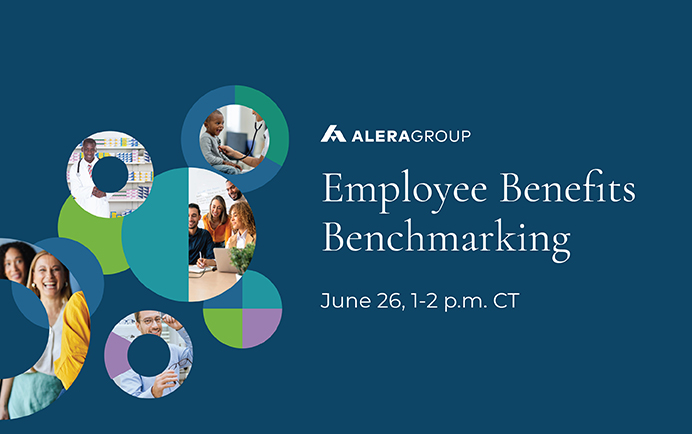Employee Benefits
Benchmarking: How Do Your Organization’s Employee Benefits Offerings Stack Up?
June 5, 2025

In today’s employment marketplace, benefits are more essential than ever to attract and retain talent, but designing a benefits program that’s both valuable and cost-efficient is a challenge. Benchmarking your current offerings against those of your competitors is a critical part of the solution.
Benefits benchmarking enables you to:
- Know what your peers and competitors offer;
- Understand what strategies other companies deploy to manage costs;
- Recognize what members of the workforce value most in a benefits program.
Introducing Alera Group’s 2025 Benchmarking Report
For the sixth consecutive year, Alera Group is offering a valuable piece of market intelligence: our Healthcare and Employee Benefits Benchmarking Report. We’ll introduce the 2025 edition on its release date, June 26, with a one-hour webinar beginning at 1 p.m. Central Time.
(You can view the 2024 report HERE.)
Because employee benefits are ever-changing, having state-of-the-marketplace data at your fingertips is critical to creating a strategy that will set your organization up for success. Alera Group’s Benchmarking Report gives you a competitive edge when it comes to determining what types of benefits are most valuable to today’s workforce.
Our June 26 webinar will provide you with a better understanding of the current state of employee benefits and offer strategies for applying these insights to your own benefits program.
The benefits of benchmarking
The industry publication HR Director does a good job of highlighting the value of benchmarking in the November 2024 article “6 Reasons Why Benchmarking Your Employee Benefits Is an Absolute Must”:
- Keeps your business competitive
- Enhances employee engagement
- Controls costs (without compromising value)
- Adapts to changing employee expectations
- Strengthens your employer brand
- Identifies gaps and opportunities for improvement.
Alera Group benefits experts and data analysts have done the benchmarking research for you, compiling and assessing survey responses from more than 6,600 employers and almost 16,000 medical-plan participants. We’ll discuss the results in the June 26 webinar, helping you get a clearer picture of how your organization stacks up against your peers and competitors.
What our analysis revealed
Key findings in the 2025 Healthcare and Employee Benefits Benchmarking Report include:
- Multiple factors in the benefits industry have made analytics and innovation increasingly necessary in devising cost-control strategies.
- The trend among larger companies is to use some version of self-funding, including a Captive solution and usually with administrative-services-only (ASO) support.
- Plans sponsored by employers of all sizes have expanded the number of pharmacy tiers they offer, each with a maximum amount.
- While the percentage of tiered coverage is consistent for specialty drugs, a rising percentage of plans also include a maximum on brand formulary and brand non-formulary pharmacy.
We’ll go deeper into those findings on June 26. For more Alera Group’s benefits benchmarking services and employee benefits webinars in the meantime, visit our Benefits Benchmarking webpage.
